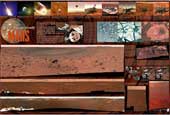
 |
|
|
|
If anything, Richard Panek’s new book shows that the story of how discoveries are made is just as exciting as the discoveries themselves. At its heart it’s the story of scientists who made unexpected discoveries that challenged what we know about the Universe. From Robert Wilson and Arno Penzias’ accidental discovery of the cosmic microwave background radiation, to Vera Rubin’s unintentional discovery of dark matter, to the astounding finding by two teams of scientists locked in furious competition that our Universe will expand forever, none of it was expected. And yet dark matter and dark energy together make up about 96 percent of the Universe (the remaining four percent, referring to the title of the book, being stars, planets, gas and all the atoms that make up us). To understand dark matter and, in particular, dark energy involves a struggle to make astronomy compatible with physics, and it is this that drives much of the drama. It is in the chapters describing the discovery of dark energy, where Panek chronicles the competitive edge between the Supernova Cosmology Patrol – made of physicists from the Lawrence Berkeley National Laboratory led by Saul Perlmutter – and the High-Z team made from astronomers at various institutions led by Brian Schmidt and Adam Riess, that the book excels. The two teams fought tooth and nail to beat the other to the results, and in the end they independently made the discovery that turned cosmology on its head. The scientists’ personal tales of discovery are almost romantic in a sense, and Panek’s book inspires and awes in equal measure. Surely anyone who has doubts about dark matter and dark energy would reconsider after reading The 4% Universe. If it has a real fault, it’s that the story of the ‘dark universe’ doesn’t have an end yet, which Panek acknowledges with a ‘to be continued’, and hence we’re left with an anticlimax, although that can hardly be helped. Perhaps, one day though, there will be a sequel. Until then we can only anticipate the discoveries ahead of us. Keith Cooper |
|
|
|
2009 Yearbook This 132-page special edition features the ultimate observing guide for 2009, a review of all the biggest news stories of 2008, in depth articles covering all aspects of astronomy and space missions for 2009, previews of International Year of Astronomy events and much, much more. This 132-page special edition features the ultimate observing guide for 2009, a review of all the biggest news stories of 2008, in depth articles covering all aspects of astronomy and space missions for 2009, previews of International Year of Astronomy events and much, much more.Infinity Rising  This special publication features the photography of British astro-imager Nik Szymanek and covers a range of photographic methods from basic to advanced. Beautiful pictures of the night sky can be obtained with a simple camera and tripod before tackling more difficult projects, such as guided astrophotography through the telescope and CCD imaging. This special publication features the photography of British astro-imager Nik Szymanek and covers a range of photographic methods from basic to advanced. Beautiful pictures of the night sky can be obtained with a simple camera and tripod before tackling more difficult projects, such as guided astrophotography through the telescope and CCD imaging.Exploring Mars  Astronomy Now is pleased to announce the publication of Exploring Mars. The very best images of Mars taken by orbiting spacecraft and NASA's Spirit and Opportunity rovers fill up the 98 glossy pages of this special edition! Astronomy Now is pleased to announce the publication of Exploring Mars. The very best images of Mars taken by orbiting spacecraft and NASA's Spirit and Opportunity rovers fill up the 98 glossy pages of this special edition!Mars rover poster  This new poster features some of the best pictures from NASA's amazing Mars Exploration Rovers Spirit and Opportunity. This new poster features some of the best pictures from NASA's amazing Mars Exploration Rovers Spirit and Opportunity. |
||||||||||||||||||||||||